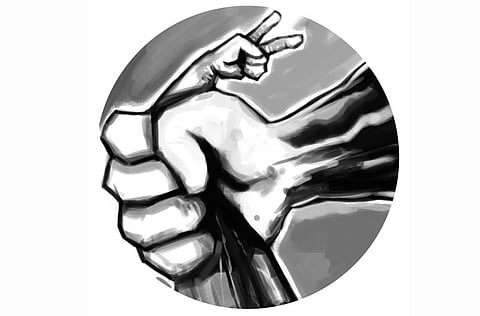Chinks in Iran's armour of bravado
Despite outward defiance, the country's regime appears disconcerted by criticism over its human rights violations

Never before in its 31-year history has Iran been under so much attack for its human rights practices as it is today. Since the massive crackdown on dissidents in the aftermath of last year's disputed presidential election, the United States and the European Union have consistently berated Iran over its repressive policies; and last week, the United Nations General Assembly voted for a resolution to condemn the treatment of women, intellectuals, labour activists and religious minorities in the Islamic republic.
Tehran has responded so far with utter denial and defensiveness, throwing the charges back at its critics in a predictable and sometimes childish manner. "The whole thing is a puppet show. There is blatant violation of human rights in America, Canada and the Europe," said Manouchehr Mottaki, Iran's Foreign Minister, referring to the UN Resolution which was pushed by western countries.
In the meantime, Iranian security forces continue to arrest political, labour, religious and human rights activists, or even lawyers who dare to represent them. Earlier this month, five legal representatives, four of them young women, were imprisoned on lame charges of speaking to the foreign media about injustice in their country, and the Iranian judiciary keeps warning dissidents that it would not tolerate the slightest criticism of the system.
The relentless onslaught is apparently regarded as indispensible in order to avoid a repeat of the post-election uprising last year that shook the regime to the core.
Despite the outward defiance, however, the Iranian regime appears disconcerted enough by all the negative publicity coming its way and some officials within the conservative establishment are scrambling to dispel the impression.
Last week, Mohammad Javad Larijani, a senior judiciary adviser, travelled to New York to try and avert the UN resolution. He even invited the UN High Commissioner on Human Rights to visit Iran next year for an independent inquiry.
Reaction
Larijani failed in his mission, but he took the opportunity to spell out some of the frustrations the Iranian regime feels about the orchestrated assault on its image. "Our only crime is that we do not want to copy western democracy and want to be guided by Islam," he told reporters.
Hard as they try to show a unified front to the outside world, Iranian leaders are anything but united on the issue of human rights and ways of dealing with dissidents, many of whom are top personalities of the 1979 Islamic Revolution. While severe hardliners in the Revolutionary Guards and the clerical establishment demand a tougher stance, the judiciary has tried to take a more measured approach, obviously on cue from Supreme Leader Ayatollah Ali Khamenei.
The more foresighted elements within the regime seem to be wary of long-term consequences of extreme tactics at a time when their country is under international scrutiny for its dubious nuclear programme.
Up until now, the US and its allies have tried to keep the nuclear issue separate from human rights, but pressure keeps mounting for both issues to be addressed at once.
Earlier this week, a group of top Iranian scholars asked UN Secretary General Ban Ki-moon to intervene for the release of ex-foreign minister Ebrahim Yazdi. Yazdi, who is about 80 years old, was arrested months ago for attending an unlawful Friday prayer.
Growing international pressure might have already yielded slight results. Back from the UN conference, Larijani said there was a chance Sakineh Mohammadi Ashtiani, a woman whose sentencing to death by stoning for adultery has drawn an international outcry, might be spared death.
This, however, seems to be little more than a publicity stunt, as there is little indication of a substantial shift in human rights policy in Iran. Justice Minister Morteza Bakhtiari said this week that Iran had twice as many prisoners (about 200,000) as it had room for. Although the majority of inmates are convicted of drug violations and violent crimes, the number of political prisoners is unprecedented since the early years of the Islamic Revolution.
Moreover, prison conditions are far from decent, with one such facility ordered closed last year after committing well-documented atrocities. Poignant tales of abuse leak out of prisons every day, although torture is banned under the Iranian constitution.
Last week, in an open letter from Tehran's Evin Prison, Iranian writer and filmmaker Mohammad Nourizad challenged the judiciary chief Ayatollah Mohammad Sadegh Larijani to take a stance on "horrendous" acts of torture committed. "What would you do if they shoved the head of one of your loved ones into a toilet to draw confession?" he said.
Such revelations have further tarnished Iran's image at a time when the country faces enormous problems at home, a fierce power struggle at the top and potential unrest.
Torture is by no means unprecedented in Iran. It has been widely practised since the revolution and even before under the Shah. But what makes it stand out nowadays is the country's deteriorating reputation as a potential international menace.
The UN resolution, passed with a clear majority, indicated that the Islamic regime is fast losing friends among nations and the trend is likely to continue.
Mehrdad Balali is a journalist and writer living in California. His novel Houri was recently published in New York.



